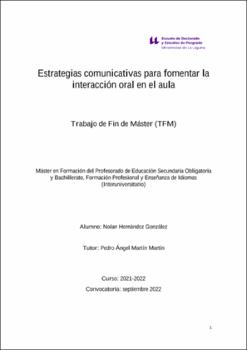Estrategias comunicativas para fomentar la interacción oral en el aula
Author
Hernández González, NolanDate
2022Abstract
En la actualidad, la globalización y el avance de las nuevas tecnologías han hecho que
aprender una lengua extranjera sea un requisito para adaptarse a una sociedad cada vez
más intercomunicada. En el contexto educativo español, el inglés se ha establecido como
la lengua extranjera de más relevancia. Pese a su importancia, el alumnado se suele
encontrar con dificultades a la hora de dominar las cuatro destrezas básicas, sobre todo,
en lo referente a la destreza de expresión oral. Este trabajo de investigación tiene como
objetivo adoptar un enfoque de investigación-acción para analizar las dificultades que dos
grupos de alumnado de 1º de la ESO de un centro educativo de Tenerife puedan presentar
a la hora de realizar actividades orales. Los instrumentos de esta investigación y
procedimientos utilizados han sido: un proceso de observación inicial, una entrevista
realizada a tres profesores de inglés, un cuestionario inicial administrado al alumnado y
el análisis del libro de texto utilizado como material curricular. Para contribuir al
desarrollo de la comunicación oral en el aula, un compendio de actividades orales ha sido
diseñadas e implementadas. El resultado de la implantación de estas actividades ha sido
favorable y ha fomentado la participación del alumnado en la lengua meta mediante un
clima distendido y abordando temas cotidianos de su interés.
Palabras claves: comunicación oral, destreza oral, investigación-acción Currently, globalization and the rapid development of new ICT tools have made
possible the fact that learning a foreign language happens to be a requirement to get to
live in an interconnected society. English has been regarded as the foreign language of
most prominent relevance in the Spanish educational setting. Despite its pertinence,
pupils generally may encounter some barriers when it comes to mastering the four main
language skills, chiefly, in the case of spoken interaction as skill. Based on an action
research approach, this study aims at examining the apparent challenges for two groups
of 1º ESO students in a high school in Tenerife when it comes to getting involved in oral
communicative activities. The instruments and procedures used in this research are the
following ones: an initial observation process, an interview to be conducted with three
4
English teachers as participants, a questionnaire to be completed by 1º ESO students and
a detailed analysis of oral activities of the English book that is used as curricular material.
To foster oral communication in the EFL classroom, a set of oral activities has been
designed to be implemented. The outcomes of these activities as proposals for further
improvement have been favorable since they have fostered the pupils’ engagement in
using L2 for communicative purposes through a comfortable learning atmosphere where
day-to-day affairs of the student’s interest were addressed.
Key words: action research approach, oral communication and speaking





